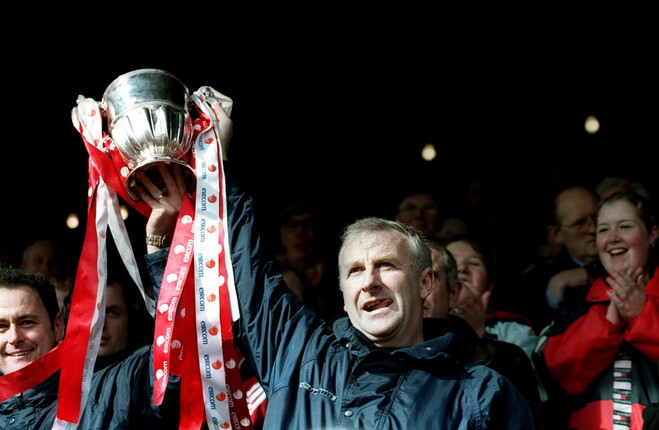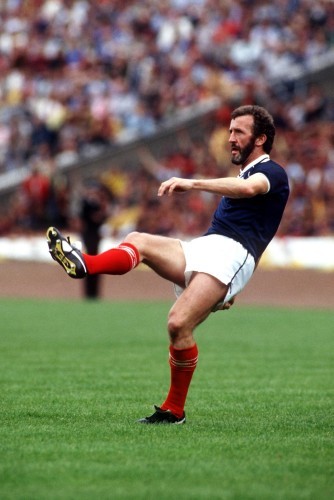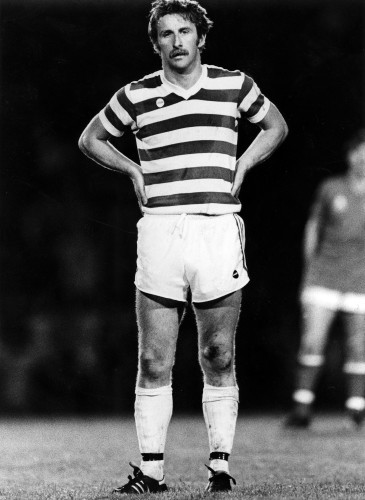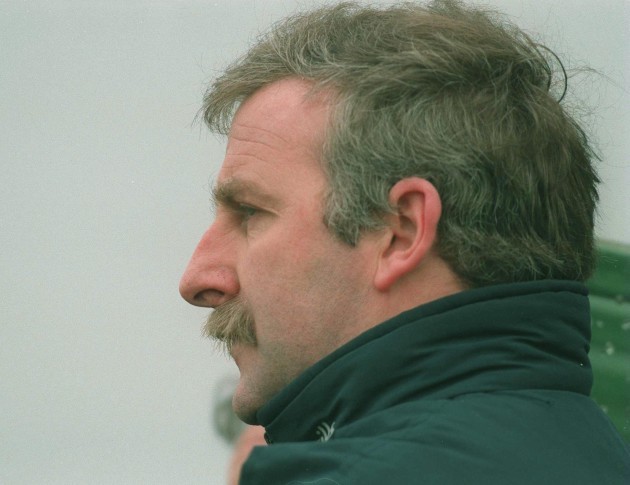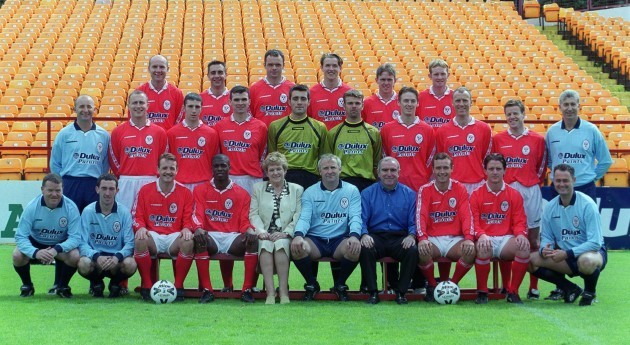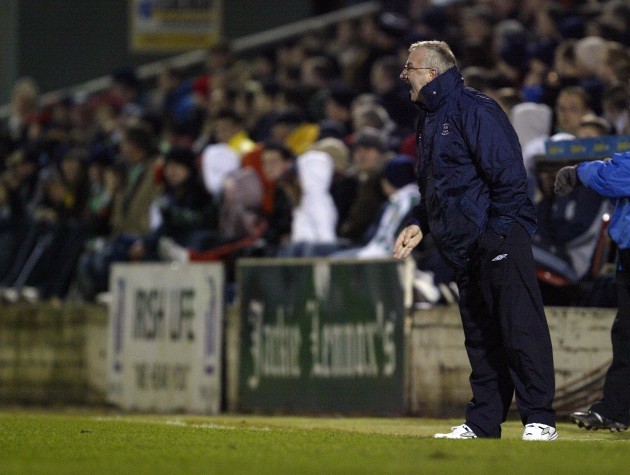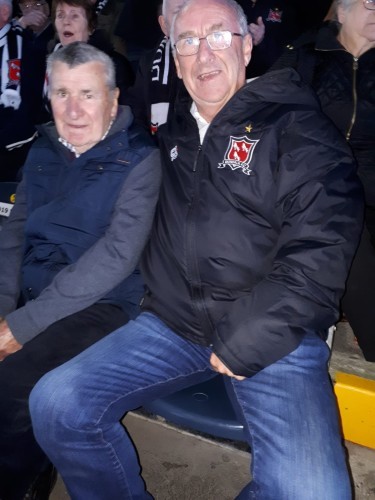DERMOT KEELY IS a self-proclaimed “mad man”, but he regrets little about a League of Ireland career that saw him repeatedly sweep the honours board.
From winning the FAI Cup with Home Farm in 1975, to a double triumph at Dundalk and subsequently coming within a whisker of reaching the European Cup last eight, to backboning Shamrock Rovers’ history-making four-in-a-row side, and doing it all again as a manager, the Dubliner is the epitome of a League of Ireland legend.
“I look back on my life and for a fella with such a lack of ability on the ball, it’s been amazing,” he tells The42, from his pub in Lanzarote, where he now lives.
“I’m very, very lucky and I know I am. I couldn’t second guess that and say: ‘well, if I’d to have done that I could have been that’.
“What happens is what happens. If, at the end of my life, I had the chance to go back over it, I don’t think there is very much I’d change.”
But there is…
1. “I was a cocky bastard from day one who knew everything”
Jim McLaughlin — his “football father” — took him to Dundalk in 1978 at a time when the Lilywhites were beginning their renaissance.
A young lad who had been part of Home Farm’s incredible FAI Cup win three years earlier, Keely had spent time at St Patrick’s Athletic prior to moving to Oriel Park.
He immersed himself in the then Pat’s team culture and “would have died there”. In spite of their lacklustre approach to training, the Dubliner got himself “really fit” and after the death of Brian McConville, on the night of a game in which he faced Keely, McLaughlin ear-marked his man.
“Brian was a super player, but, like myself, he was also mad in the head. I think McLaughlin’s plan was to replace a mad man with a mad man.”
And life changed forever more.
“I walk into Dundalk and it’s very like Lanzarote, I came here once and I said: ‘yeah, this is the place’. The minute I walked into Dundalk, I knew, ‘this is it’, I loved it.
“At the time there was the border and smuggling. It was called El Paso and everybody had something bad to say about it, but I loved it from day one.
“To be fair to the people, it’s been repaid. My adoration has been reflected back because people come out here in their droves. Any time anybody comes from Dundalk they come to see me.
“I never considered that I gave people pleasure. I did it for myself, I did it to win a medal, but when you come here now and listen to people talking, you realise you were a part of an awful lot of people’s lives.
We won four-in-a-row at Rovers, it was a smashing side and I loved it, but home was always Dundalk. I don’t why. Part of the lunacy in me, I suppose. Me and it clicked.”
There was a click with Tommy McConville, too — both on and off the field. Upon Paddy Dunning’s return, the former shifted out to right-back, with Keely and Dunning paired in the centre to form one of the league’s most fearsome trios.
The double win in 1979 was “incredible” and the following year Dundalk entered the European Cup, progressing through two rounds and disposing of Linfield in a bloody affair, before being paired with Glasgow Celtic in the last 16.
A daunting prospect, but Keely and co relished it. For a player who, while at Home Farm, was previously part of a team that “would do a lap of honour after losing 3-0 in Cork”, the tables had turned and belief rightly dripped from their sweat-soaked shirts in a 3-2, first-leg loss at Parkhead.
“We frightened the life out of them,” he says in a laughter-tinged tone.”
He pauses.
“Nowadays you’d go off and have your pasta and get to bed early afterwards, but I mean we went on the lash. That was your night off, I can guarantee you there was no pasta that night.”
Later, he typifies the confidence with which the Lilywhites approached that encounter. Fearless. Not even Celtic legend Danny McGrain’s shirt was of interest.
“I could have got Danny McGrain’s shirt, but it never entered my head to ask him. I’d have been wondering why he wasn’t asking me for mine!”
The second leg saw the Lilywhites draw 0-0, McConville arrowing an effort just off target. Had that gone in, Dundalk were bound for a quarter-final tie with Real Madrid. Not to be.
Still, Keely’s display was enough to garner interest in him from the Glaswegians, but nothing came of it. The steely centre-half was content in the League of Ireland, with his teaching job and settled setting.
Keely is interviewed by George Hamilton after the second leg against Celtic 2:30 into the video below:
Though, what seemed like only being the start of something special was in fact a prelude to the end. Within two seasons McLaughlin and Keely “fell out over something stupid” and he was on his way.
What seemed like a perfect combination for club and player was at an end.
But it wasn’t…
2. “I failed to understand the connection of Rovers to Milltown. I didn’t care”
Following his Dundalk departure, Keely spent a few years with Glentoran, winning all bar the Irish League title, before coming back south, taking over as player-manager at UCD.
Yet his stint in Belfield was short-lived, financial problems the reason given for his necessary exit. Although, in reality, Keely reckons McLaughlin, now manager of Rovers, had “done a deal” with the Students’ board. Not that he cared.
“I would say in that Rovers team, there were 10 footballers and me, but McLaughlin knew I had something to bring to the party.
Pat Byrne was the orchestrator of the whole thing… I’m lucky in my life to have played with Tommy McConville and Pat Byrne. Just to say that we graced the same pitch, they’re probably two of the greatest players to play in the League of Ireland ever.”
Titles arrived in even heftier doses at Rovers — four leagues, two cups, and player of the year accolades. But, there was something missing despite all the great players and fabulous football. Even when he took over as player-manager, after McLaughlin had guided the club to three championships on the trot, it wasn’t… it wasn’t Dundalk.
“I’m a Dub and I’m proud of it, but I always felt that when I was playing for Dundalk I was playing for the town.
“Because Dublin is so big and Rovers is such a big club, you were playing for Shamrock Rovers, which is an institution like Glasgow Celtic, but I didn’t have the grá that I had for Dundalk and the town of Dundalk because Rovers is Rovers. It’s legendary, but Dundalk, to me, always had a soul.
“When I played for Dundalk Football Club I played for the people of Dundalk. When I played with Rovers I played with the best players, but never felt that tie, the pull, the love or the affection. It was very much business-like, we won matches playing beautiful football.
“I’ve, all my life, travelled to win a league or a cup, I don’t think of anything else… but there was no romance for me in Rovers. They were just going to be my vehicle to win more leagues and cups, and I failed to understand the depth of feeling that people had for them.”
And this all factored in to the Hoops’ eventual demise, their decades spent homeless. Glenmalure Park. Milltown. It was just a place where success happened, not a core reason for it, Keely felt. He has one lingering regret from his career, and it’s this misunderstanding.
“I’m a slow learner. It takes me a long time to understand things and I’ve had to apologise for this over the years.
“You think how driven I am. I’ve just managed the team to another double (1987) with probably the best record. All I could see was another league next year, that team was capable of winning another two or three leagues.
“My instinct was to say that ‘I didn’t care where we play, I’d play anywhere’ because I wanted to keep the team together and to win the league again.
I failed to understand the connection of Rovers to Milltown. I didn’t care. I said at the time that if we played our home matches at Dollymount Beach we would have won them. That was where my head was.
“Now, in hindsight, I failed to grasp the feelings of the people who were going to Rovers. They were, in fact, losing their club. I didn’t know and I didn’t care. I just wanted to win another league.
“As you get older you realise how stupid that is. In one sense, I played for Dundalk for the town, but, on the other hand, I failed to grasp that so many other people had the same feeling for Shamrock Rovers — and I missed that because I was so single-minded, so convinced that there was another league medal.
“That was all I thought of, and I was wrong. I didn’t buy into it, I bought into Dundalk, but Pat and Mick Byrne, all those people did. They loved that club with the passion that I loved Dundalk. It wasn’t just moving the ground, you were changing a life.
“I know to this day Rovers fans of my generation would feel that I let them down. And, to be truthful, I did.”
3. “The signs were there; just read them and go”
He buckled his knee playing in America shortly after leaving Rovers, but fought on for another year at Sligo with “a big, white bandage on”. Retirement was his self-diagnosis.
“I knew I was finished when people who I would give 25 yards to in a sprint would beat me over 50 yards. They started running by me like I wasn’t there and I couldn’t cope.
“McLaughlin told me afterwards that it was just me being arrogant and that what I should have done was, because I had a football brain, learn to play with my head, not my body.
“But I didn’t see that. I could only see failure. In my own head, when I stopped being the best, I was done, I retired.
Management stints in Sligo and Longford followed, before a call came from home, Dundalk. Turlough O’Connor was gone after another glorious era and Keely was to be his replacement.
He guided to the club their ninth league title in 1995 on a dramatic final day, where they edged Derry City and Shelbourne, but that papered over the many cracks.
“It was a tough year; winning the league made no difference.
Every week you went in and they were cutting your budget. They were business people, but they failed to understand football and it was a tough time. I’d endless rows with Enda [McGuill] and the Board… I don’t think I’ve overstayed my welcome anywhere.”
Finn Harps and Athlone came in subsequently, as did Home Farm, before, in 1998, he became manager of the club of his father Peter, Shelbourne, sparking into motion a glorious period in the Tolka Park side’s history.
A two-time Premier Division champion, Keely also guided the Reds to their maiden league and Cup double in 2000, while significant progress was made in Europe. But that setting had changed, continental competition was “no longer about romance, it was business”.
“No one’s ever come up to me and said: ‘so and so’ took the piss out of you in Europe.”
His captain, Pat Fenlon, was his successor, Keely having left in 2002 with nothing but good memories.
It’s one of the clubs that I’ve real affection for, Shels. We’d a smashing bunch of players. Pat Fenlon, a real captain.”
Kildare County were his next outfit as he “strived for something different” before Derry City offered him their post.
“It should have been my step back into the big time, but I was there about six weeks and they hated me. It just never worked.”
Dublin City became his 12th club in management, prior to a much-changed Shels reappointing him in 2007. He twice lost out on promotion on the final day, including to Dundalk in 2008 when a draw at home to Limerick cost the Drumcondra men the First Division title.
Yet he looks back on it now with some fondness. Although Shels have never meaningfully arisen from the wreckage of it, Keely, in some small way, was a part of Dundalk’s resurrection, which has since developed into greatness and immortality.
“Karma! Isn’t it just strange the way things happen. Not being involved with Dundalk, but being involved with something that was the start of something special…”
4. “I’ll never repay the chance Jim gave me”
Keely made a trip home recently and attended Dundalk’s 2-2 draw with Derry City at Oriel Park with his former boss, McLaughlin — the man who was omnipresent as the now 65-year-old made his way in the game.
Getting to watch the Lilywhites’ European exploits of the last number of years brought memories flooding back. The football they played was up there with the Rovers team of the mid-80s. However, the Dundalk side of ’79 trumps all.
“I would say the recent Dundalk team and the Rovers four-in-a-row team were better footballers than the ’79 team, but I still think we’d have beat the two of them.
“It’s impossible to compare eras, but, in my head, if you could transport each team into a mini-league, I think the Dundalk ’79 team would win it.”
He pauses again, before adding: “Sometimes you’re just blessed. Everyone, as a player or a manager, always needs a bit of mojo and I felt I had that in football.
“If there were only two names in a draw, I would always lose, but in football I always seemed to have that little bit of extra luck and if I got to a final I usually won it. That’s something that’s intangible, you either have or you don’t have.”
5. “My football life has been complete, the League of Ireland has made my life”
The last word, from one of the great characters in Irish football.
“The League of Ireland — it’s why I’m so passionate about it, it’s why I have a blog, it’s why I’m so anti-Delaney.
“The league has been so good to me. People say to me: ‘Why didn’t you go to Glasgow Celtic?’ It wasn’t a match for the league, I’ll never look back and say I regret it.
“My football life has been complete, the League of Ireland has made my life. Fantastic. I’m one of the lucky ones to be able to say that.”
